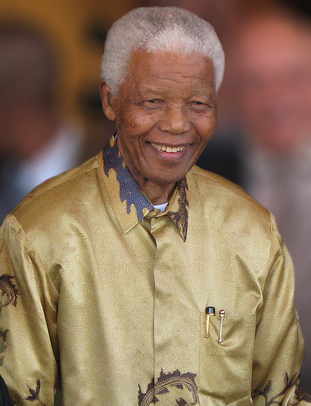Originally posted on the School of Advanced Study blog.
Keith Somerville, a senior research fellow at the Institute of Commonwealth Studies (ICWS), who was able to observe at first-hand, developments in South Africa, helped to organise the recent Mandela: Myth and Reality conference. Coming a year after the death of the country’s first black president, it brought together a remarkable group of experts to analyse his contribution to the creation of the new, free South Africa.
By Keith Somerville
On 5 December, the anniversary of the death of Nelson Mandela, the Institute of Commonwealth Studies held a conference which examined in detail the complexities of his legacy as a nationalist leader, his relationship with the South African Communist Party, his management of the transition from apartheid, his record as president and the construction of his powerful media image. The well-attended, day-long event was marked by contending views, informed argument but also mature debate with papers presented by leading African and British academics, people who knew and worked with him, and prominent journalists.
The day started with an artistically powerful and stunning new documentary on Mandela by the South Africa film-maker Khalo Matabane. Utilising archive film and interviews with South African activists, leaders and commentators who knew Mandela, world statesman and, most importantly, young South Africans who grew up in the Mandela era, it shone a bright light on Nelson Mandela the man and the leader, and on the South Africa he left behind.
No punches were pulled in describing the problems and massive inequalities that still mark the country, 20 years after the ANC took power. Young black South Africans talked about the problems of unemployment and the poor living conditions of the majority of black people. Khalo, in his film and answers to the audience’s questions, said that while everyone praised Mandela for his policy of reconciliation, he felt forgiveness had perhaps gone too far and people hadn’t been held to account. Mandela took time to pursue reconciliation when he should have given more attention to raising the living standards of the poor and marginalised.
The day proceeded with a panel on Mandela as a nationalist leader focusing particularly on his relationship with the South African Communist Party and the effects that had on Mandela’s outlook and the development of the ANC. Contending views were put forward by Professors Stephen Ellis, author of External Mission: The ANC in Exile, Tom Lodge, a biographer of Mandela, and Hugh Macmillan, who has written widely on the ANC and its relations with Zambia and other Africa states, and Moses Anafu, who worked with Mandela during the transition period as Commonwealth head Emeka Anyaoku’s special representative.
Stephen Ellis was clear that Mandela was a member of the SACP Central Committee and felt that the communists had been the dynamic force behind the move towards armed struggle in South Africa. Tom Lodge took a different view and gave a fascinating account of the construction of Mandela’s image. He was less concerned about party membership, while Hugh Macmillan said this concentration on communism was a hangover from the Cold War and that the ANC pushed for armed struggle to compete with the break-away and radical Pan-Africanist Congress. Moses Anafu was clear that in terms of policy and the role of Mandela in the transitional period, his relationship with the party was effectively irrelevant.
While no final agreement was reached on the nature and importance of the communist link, the session was ably summed up by Professor Saul Dubow, who made the point that whether or not Mandela was formally a member of the communist party, what mattered was the effect on policy and ANC actions. His conclusions and the answers to question from the audience, established a good base from which to proceed to the next panel dealing with post-apartheid leadership.
In a wide-ranging session, Dr Desne Maisie, Dr Funmi Olonisakin, Knox Chitiyo and Paul Holden looked at key aspects of Mandela’s presidency and legacy as a government leader, with detailed examinations of the economy and continuing inequality, the problems of corruption in South Africa, Mandela as a leader in southern Africa and his overall style of leadership. Dr Merle Lipton summarised the wealth of material and presented an acute critique of governance and economic management under the Mandela government.
The final session dealt with Mandela’s media image and his relationship with the press. Chaired by Professor Winston Mano, this examination was carried out by former BBC correspondent Peter Biles and Richard Dowden, the Director of the Royal African Society. Both knew Mandela and covered his period in power, and his retirement.
They stressed how Mandela used charm and his immense personal presence to woo and dazzle the media in a way that often protected him and his government from criticism.
Each session was marked by lively debate and participation from the audience, itself reflecting a wealth of political activism, academic knowledge and journalistic experience. The day offered an excellent opportunity, which was seized eagerly by speakers and audience alike, to open a thorough and, I’m sure, continuing debate on Mandela the man, leader and legend.
The discussions established the parameters for this debate and was valuable in reaffirming the influence, personal prestige and immense political influence that Mandela brought to bear on South Africa, Africa and the last two decades of the 20th century. The reality of what he achieved and the areas where reconciliation took precedence over reconstruction and redistribution of wealth was examined and debated, while the construction of the media image and mythical status was also brought to the fore.
The conference was organised by Keith Somerville and Martin Plaut (both senior research rellows at the Institute of Commonwealth Studies), Dr Sue Onslow and Olga Jimenez. The organisers are grateful to the Rosa Luxemburg Foundation for paying the expenses of Khalo Matabane. A podcast of the day is available here.


Recent Comments